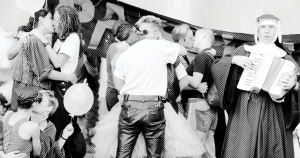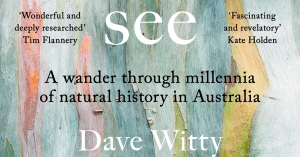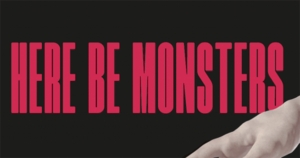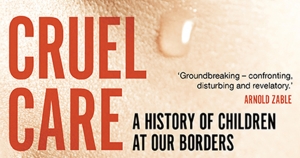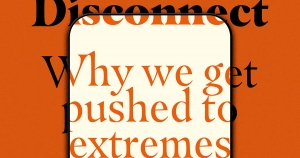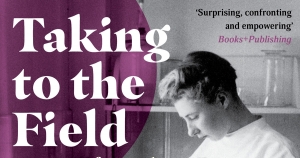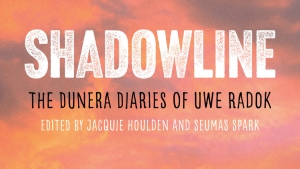Monash University Publishing
Zora Simic reviews ‘Personal Politics: Sexuality, gender and the remaking of citizenship in Australia’ by Leigh Boucher et al.
The slogan the ‘personal is political’ is now so well-worn that it has congealed into cliché, though the notion itself can still produce a backlash if we take regular diatribes against ‘identity politics’ as a measure. In such rants, it is as though only some of us possess an identity that we mobilise around politically, whether under the LGBTQI+ umbrella, as First Nations peoples, as part of ethnic communities, or as ‘women’, the world’s largest special interest group. Given that critics of ‘identity politics’ tend to be socially conservative, the targets of their reductive invectives are presumed to lean to the left politically.
... (read more)Ashley Hay reviews ‘What the Trees See: A wander through millennia of natural history in Australia’ by Dave Witty
The photograph arrives while I am reading Dave Witty’s What the Trees See. A tree’s branch close-up, outer brown-red bark peeled back to smooth and brilliant green. A friend, spotting it on Quandamooka Country in Minjerribah, North Stradbroke Island, has been understandably stopped in her tracks. Framed intimately like this, its shape and textures suggest warm musculature: lean in, you will be held. This beautiful creature.
... (read more)Seumas Spark reviews ‘Paul and Paula: A history of separation, survival and belonging’ by Tim McNamara
In Working: Researching, interviewing, writing, published in 2019, the great biographer Robert A. Caro tells of his writing methods and the lengths to which he goes to gain a better understanding of his subject. Reading Tim McNamara’s Paul and Paula, I was reminded of Caro’s way of research and writing and of his determination to place himself in his subject’s milieu. McNamara spent considerable time in Vienna researching Paul and Paula, stalking the streets for clues, and his efforts show. He writes with verve about the book’s three main characters – Paul Kurz and his wife, Paula, and the city of Vienna, before and during the Nazi occupation – and his search to uncover and understand their stories.
... (read more)Robyn Arianrhod reviews 'Here Be Monsters: Is technology reducing our humanity?' by Richard King
Back in the day, I was wary about making a career in science. It wasn’t just the lack of women; it was also a sense of moving into alien territory. After all, I had absorbed feminist critiques suggesting that modern science had been shaped by (male) scientists’ urge to ‘penetrate’ nature by reducing it to its parts – an urge that had blinded them to the power of the whole. And I was all for the whole – for Gaia, the whole Earth, not for atom splitting and nuclear bombs. But it was Rachel Carson’s Silent Spring (1962) that offered the most famous argument against reductionism. Carson pointed out that when scientists developed pesticides to kill specific insects, they didn’t take sufficient account of the knock-on effect on the environment, including the starved or poisoned birds whose absent songs would manifest in increasingly silent springs. Half a century on, we are aware of many examples of the damage reductive thinking can do, especially the burning of fossil fuels to produce electricity, changing the whole climate in the process. In Here Be Monsters, Richard King deftly explores another area of concern, which he calls ‘technoscience’, a mix of science, technology, and neoliberal capitalism that reduces everything to its parts – to genes, bits of information, and individual consumers, losing sight of the whole person and their whole community.
... (read more)Amy Nethery reviews 'Cruel Care: A history of children at our borders' by Jordana Silverstein
The historian Jordana Silverstein’s masterful new book, Cruel Care, begins with an account of the Murugappan family. Many Australians will remember this family: the hard-working parents seeking asylum from Sri Lanka, and their two Australian-born children, taken from their home in Biloela by the Australian government at five o’clock one morning in 2018. The family was detained for four years in Melbourne and Perth and on Christmas Island. The case was so drawn out that, in the rare photographs released to the public, we saw the children growing up. Their treatment was illogical, unjust, unkind, and expensive, and provoked a sharp emotional response from the public.
... (read more)Joshua Krook reviews 'Disconnect: Why we get pushed to extremes online and how to stop it' by Jordan Guiao
Reading a book about online polarisation is a bit like reading a murder mystery novel where the murderer is revealed on page one. We all know it was social media, on our devices, with the trolls, in the bedroom. What we don’t know is the human cost of our newly fragmented online world: the lives destroyed, the families torn apart, the friends permanently estranged when someone falls down an online rabbit hole.
... (read more)Jessica Urwin reviews 'Taking to the Field: A history of Australian women in science' by Jane Carey
In 1943, of the 101 science graduates of the University of Sydney, 55.4 per cent were women. That same year at the University of Melbourne the proportion was 46.2 per cent, and by 1945 women made up 37.4 per cent of all science graduates across Australia. Given contemporary anxieties about women’s involvement in science, these statistics appear unbelievable. Yet, as Jane Carey explores in Taking to the Field, between the 1880s and the 1950s women were not only completing science degrees in notable numbers but, even outside the unusual war years, were contributing valuably to Australian science through research, teaching, and social reform.
... (read more)Francesca Sasnaitis reviews 'Shadowline: The Dunera diaries of Uwe Radok', edited by Jacquie Houlden and Seumas Spark
Uwe Radok was born in 1916 in East Prussia to a family of Christian converts who identified as German Protestant. Nevertheless, after the Nazis came to power in Germany, the Radoks were classified as Jews – their five children Mischlinge, of mixed ancestry. In 1938, the family applied to emigrate to Australia. When their visas finally arrived in August 1939, it was too late.
... (read more)One of the by-products of every election is the instant analysis, often in the form of small books that read like extended newspaper articles. The success of the teals at the 2022 federal election has already produced extensive speculation about whether this signals a sea change in Australian politics.
... (read more)Alison Broinowski reviews 'Good International Citizenship: The case for decency' by Gareth Evans
Over the course of a long and distinguished public life, Gareth Evans has held fast to his conviction that as individuals aspire to personal decency and moral behaviour, the same should be replicated among nations. As a foreign minister and an author, and in his international organisations and academic roles, Evans has consistently advocated ‘good international citizenship’. Care for our common humanity he sees as both a moral imperative and a national interest.
... (read more)
